Employee Retention in UK Budget Hotels: The Role of Motivation
VerifiedAdded on 2023/04/21
|39
|12396
|477
Literature Review
AI Summary
This literature review explores the impact of motivation on employee retention within the UK budget hotel sector. It begins by introducing the background and problem statement related to employee turnover and the significance of motivation. The study aims to identify key motivational factors that influence employee retention and examines the effects of employee turnover on business performance. Research questions focus on understanding the concepts of motivation and retention, identifying motivational factors for hotel employees, assessing the impact of employee turnover, and exploring strategies for long-term employee retention. The review covers definitions of motivation, its importance, motivational factors specific to the hotel industry, and the consequences of employee turnover on budget hotels. The research methodology chapter outlines the research approach, design, philosophy, data collection methods, sampling techniques, and data analysis procedures, also addressing reliability, validity, ethical considerations, and limitations. The analysis and findings chapter uses various data evaluation techniques to show clear results.
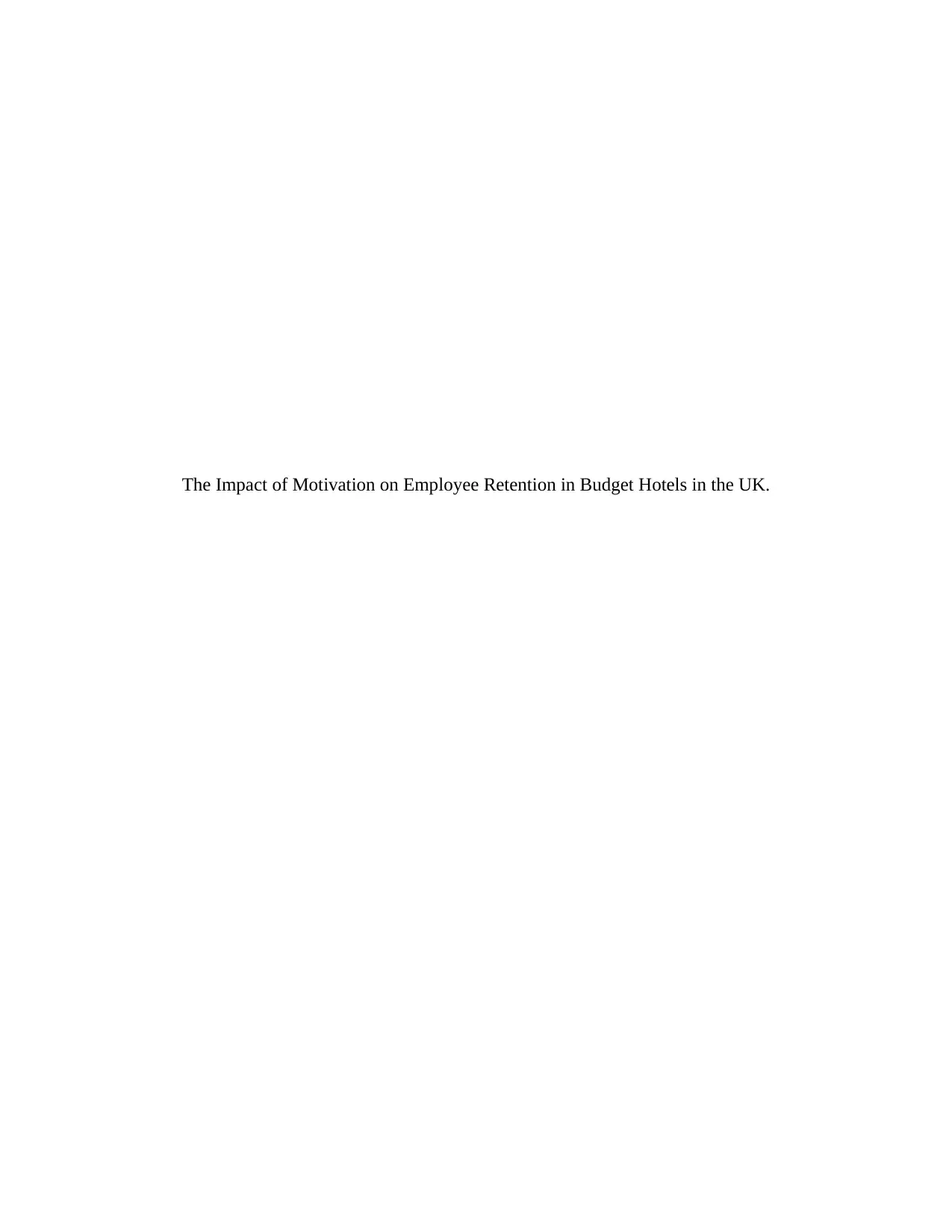
The Impact of Motivation on Employee Retention in Budget Hotels in the UK.
Paraphrase This Document
Need a fresh take? Get an instant paraphrase of this document with our AI Paraphraser
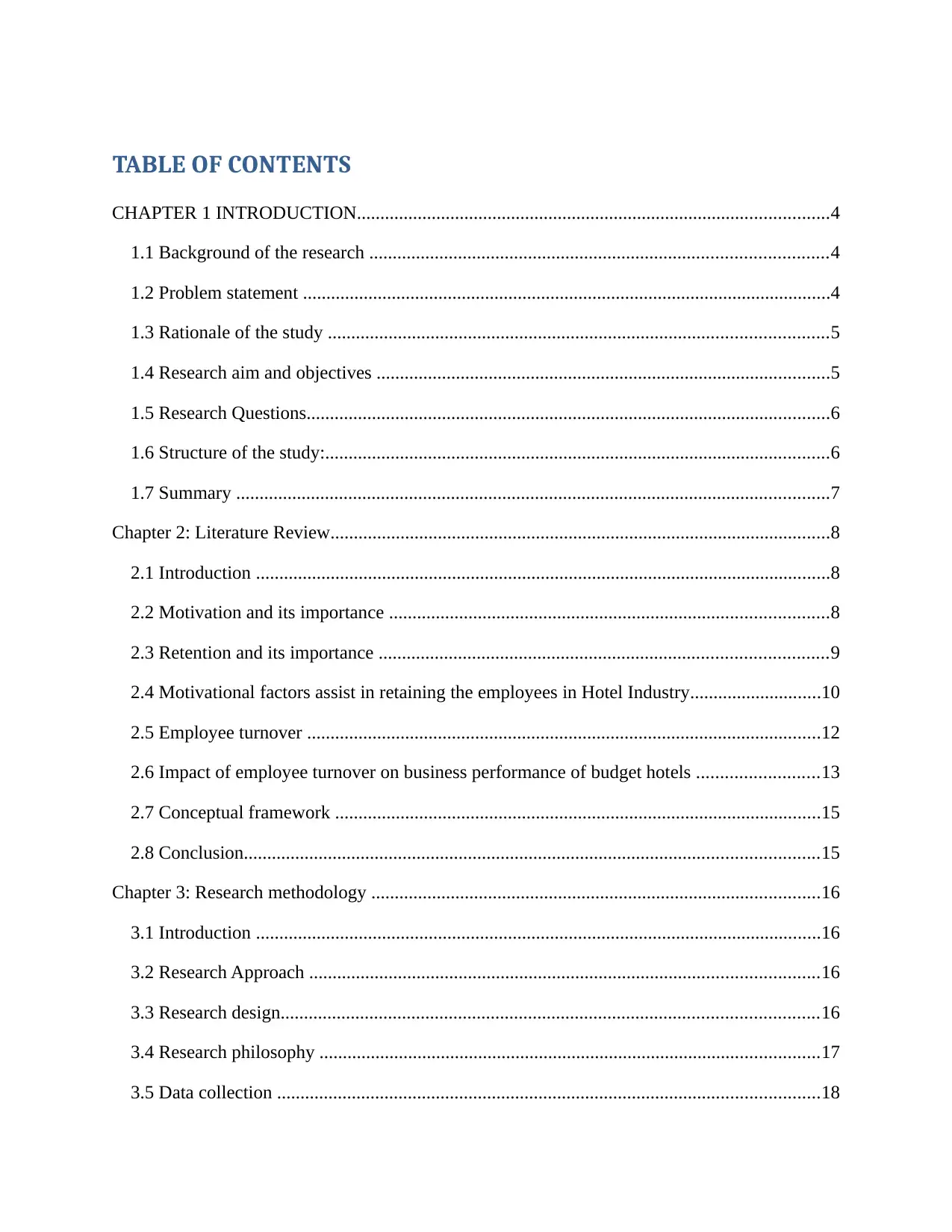
TABLE OF CONTENTS
CHAPTER 1 INTRODUCTION.....................................................................................................4
1.1 Background of the research ..................................................................................................4
1.2 Problem statement .................................................................................................................4
1.3 Rationale of the study ...........................................................................................................5
1.4 Research aim and objectives .................................................................................................5
1.5 Research Questions................................................................................................................6
1.6 Structure of the study:............................................................................................................6
1.7 Summary ...............................................................................................................................7
Chapter 2: Literature Review...........................................................................................................8
2.1 Introduction ...........................................................................................................................8
2.2 Motivation and its importance ..............................................................................................8
2.3 Retention and its importance ................................................................................................9
2.4 Motivational factors assist in retaining the employees in Hotel Industry............................10
2.5 Employee turnover ..............................................................................................................12
2.6 Impact of employee turnover on business performance of budget hotels ..........................13
2.7 Conceptual framework ........................................................................................................15
2.8 Conclusion...........................................................................................................................15
Chapter 3: Research methodology ................................................................................................16
3.1 Introduction .........................................................................................................................16
3.2 Research Approach .............................................................................................................16
3.3 Research design...................................................................................................................16
3.4 Research philosophy ...........................................................................................................17
3.5 Data collection ....................................................................................................................18
CHAPTER 1 INTRODUCTION.....................................................................................................4
1.1 Background of the research ..................................................................................................4
1.2 Problem statement .................................................................................................................4
1.3 Rationale of the study ...........................................................................................................5
1.4 Research aim and objectives .................................................................................................5
1.5 Research Questions................................................................................................................6
1.6 Structure of the study:............................................................................................................6
1.7 Summary ...............................................................................................................................7
Chapter 2: Literature Review...........................................................................................................8
2.1 Introduction ...........................................................................................................................8
2.2 Motivation and its importance ..............................................................................................8
2.3 Retention and its importance ................................................................................................9
2.4 Motivational factors assist in retaining the employees in Hotel Industry............................10
2.5 Employee turnover ..............................................................................................................12
2.6 Impact of employee turnover on business performance of budget hotels ..........................13
2.7 Conceptual framework ........................................................................................................15
2.8 Conclusion...........................................................................................................................15
Chapter 3: Research methodology ................................................................................................16
3.1 Introduction .........................................................................................................................16
3.2 Research Approach .............................................................................................................16
3.3 Research design...................................................................................................................16
3.4 Research philosophy ...........................................................................................................17
3.5 Data collection ....................................................................................................................18
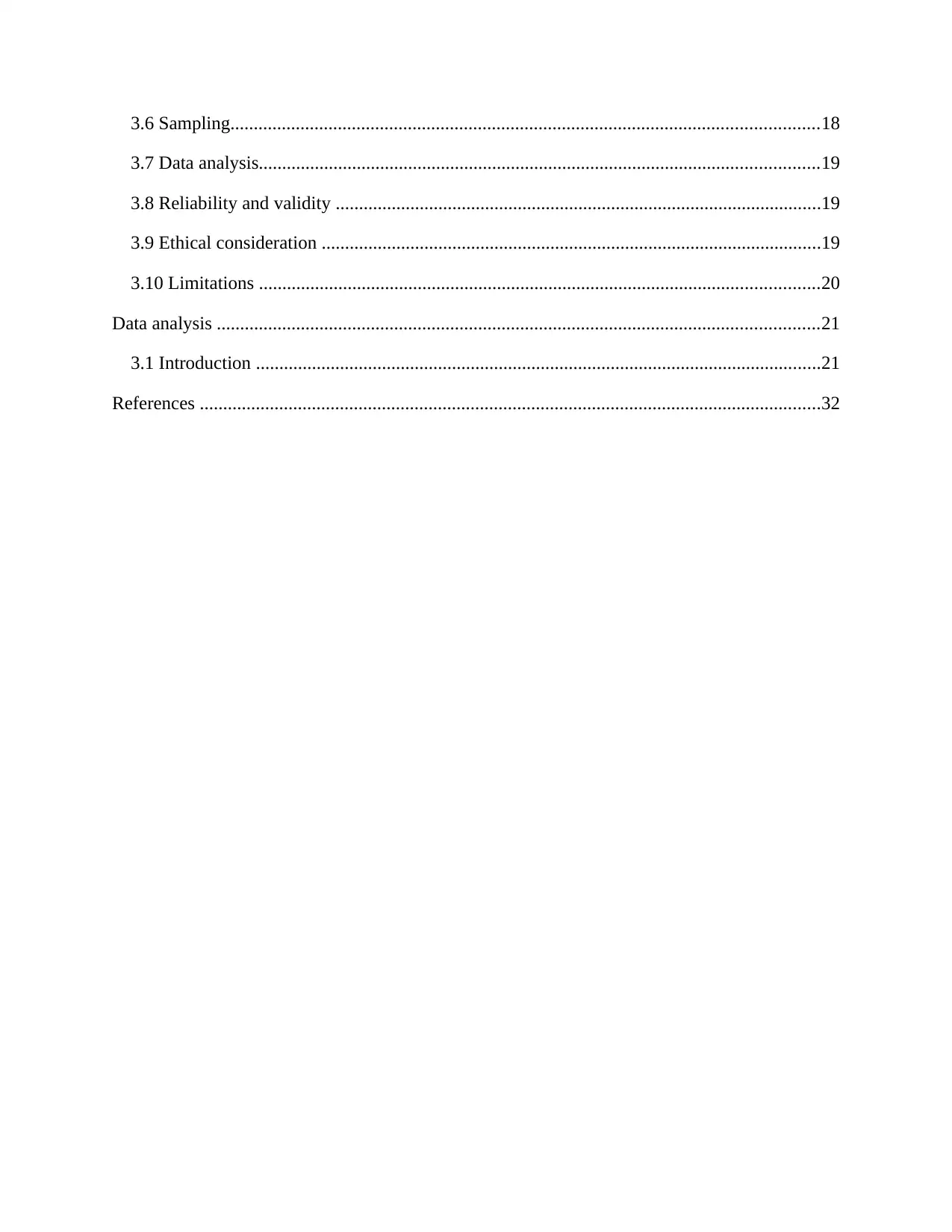
3.6 Sampling..............................................................................................................................18
3.7 Data analysis........................................................................................................................19
3.8 Reliability and validity ........................................................................................................19
3.9 Ethical consideration ...........................................................................................................19
3.10 Limitations ........................................................................................................................20
Data analysis .................................................................................................................................21
3.1 Introduction .........................................................................................................................21
References .....................................................................................................................................32
3.7 Data analysis........................................................................................................................19
3.8 Reliability and validity ........................................................................................................19
3.9 Ethical consideration ...........................................................................................................19
3.10 Limitations ........................................................................................................................20
Data analysis .................................................................................................................................21
3.1 Introduction .........................................................................................................................21
References .....................................................................................................................................32
⊘ This is a preview!⊘
Do you want full access?
Subscribe today to unlock all pages.

Trusted by 1+ million students worldwide
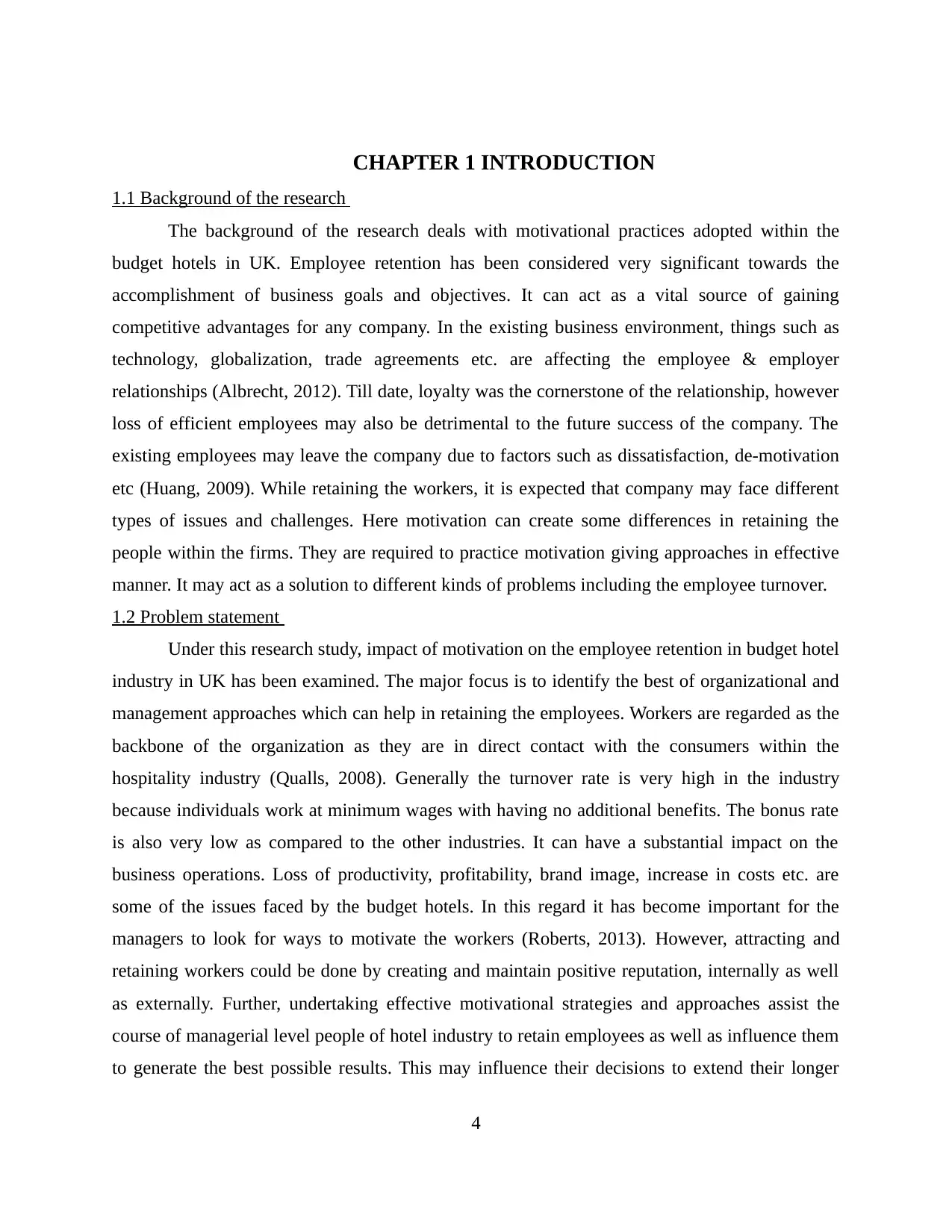
CHAPTER 1 INTRODUCTION
1.1 Background of the research
The background of the research deals with motivational practices adopted within the
budget hotels in UK. Employee retention has been considered very significant towards the
accomplishment of business goals and objectives. It can act as a vital source of gaining
competitive advantages for any company. In the existing business environment, things such as
technology, globalization, trade agreements etc. are affecting the employee & employer
relationships (Albrecht, 2012). Till date, loyalty was the cornerstone of the relationship, however
loss of efficient employees may also be detrimental to the future success of the company. The
existing employees may leave the company due to factors such as dissatisfaction, de-motivation
etc (Huang, 2009). While retaining the workers, it is expected that company may face different
types of issues and challenges. Here motivation can create some differences in retaining the
people within the firms. They are required to practice motivation giving approaches in effective
manner. It may act as a solution to different kinds of problems including the employee turnover.
1.2 Problem statement
Under this research study, impact of motivation on the employee retention in budget hotel
industry in UK has been examined. The major focus is to identify the best of organizational and
management approaches which can help in retaining the employees. Workers are regarded as the
backbone of the organization as they are in direct contact with the consumers within the
hospitality industry (Qualls, 2008). Generally the turnover rate is very high in the industry
because individuals work at minimum wages with having no additional benefits. The bonus rate
is also very low as compared to the other industries. It can have a substantial impact on the
business operations. Loss of productivity, profitability, brand image, increase in costs etc. are
some of the issues faced by the budget hotels. In this regard it has become important for the
managers to look for ways to motivate the workers (Roberts, 2013). However, attracting and
retaining workers could be done by creating and maintain positive reputation, internally as well
as externally. Further, undertaking effective motivational strategies and approaches assist the
course of managerial level people of hotel industry to retain employees as well as influence them
to generate the best possible results. This may influence their decisions to extend their longer
4
1.1 Background of the research
The background of the research deals with motivational practices adopted within the
budget hotels in UK. Employee retention has been considered very significant towards the
accomplishment of business goals and objectives. It can act as a vital source of gaining
competitive advantages for any company. In the existing business environment, things such as
technology, globalization, trade agreements etc. are affecting the employee & employer
relationships (Albrecht, 2012). Till date, loyalty was the cornerstone of the relationship, however
loss of efficient employees may also be detrimental to the future success of the company. The
existing employees may leave the company due to factors such as dissatisfaction, de-motivation
etc (Huang, 2009). While retaining the workers, it is expected that company may face different
types of issues and challenges. Here motivation can create some differences in retaining the
people within the firms. They are required to practice motivation giving approaches in effective
manner. It may act as a solution to different kinds of problems including the employee turnover.
1.2 Problem statement
Under this research study, impact of motivation on the employee retention in budget hotel
industry in UK has been examined. The major focus is to identify the best of organizational and
management approaches which can help in retaining the employees. Workers are regarded as the
backbone of the organization as they are in direct contact with the consumers within the
hospitality industry (Qualls, 2008). Generally the turnover rate is very high in the industry
because individuals work at minimum wages with having no additional benefits. The bonus rate
is also very low as compared to the other industries. It can have a substantial impact on the
business operations. Loss of productivity, profitability, brand image, increase in costs etc. are
some of the issues faced by the budget hotels. In this regard it has become important for the
managers to look for ways to motivate the workers (Roberts, 2013). However, attracting and
retaining workers could be done by creating and maintain positive reputation, internally as well
as externally. Further, undertaking effective motivational strategies and approaches assist the
course of managerial level people of hotel industry to retain employees as well as influence them
to generate the best possible results. This may influence their decisions to extend their longer
4
Paraphrase This Document
Need a fresh take? Get an instant paraphrase of this document with our AI Paraphraser
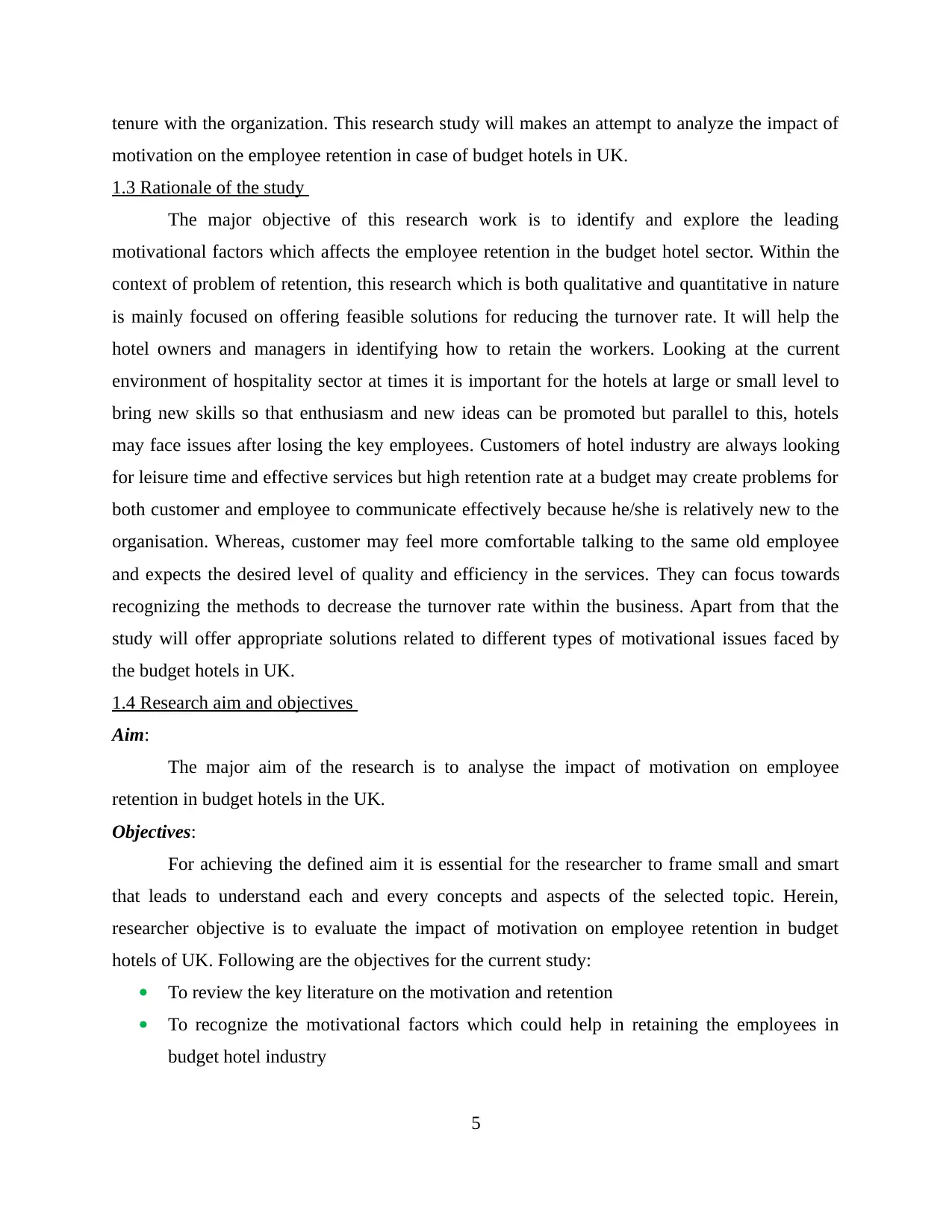
tenure with the organization. This research study will makes an attempt to analyze the impact of
motivation on the employee retention in case of budget hotels in UK.
1.3 Rationale of the study
The major objective of this research work is to identify and explore the leading
motivational factors which affects the employee retention in the budget hotel sector. Within the
context of problem of retention, this research which is both qualitative and quantitative in nature
is mainly focused on offering feasible solutions for reducing the turnover rate. It will help the
hotel owners and managers in identifying how to retain the workers. Looking at the current
environment of hospitality sector at times it is important for the hotels at large or small level to
bring new skills so that enthusiasm and new ideas can be promoted but parallel to this, hotels
may face issues after losing the key employees. Customers of hotel industry are always looking
for leisure time and effective services but high retention rate at a budget may create problems for
both customer and employee to communicate effectively because he/she is relatively new to the
organisation. Whereas, customer may feel more comfortable talking to the same old employee
and expects the desired level of quality and efficiency in the services. They can focus towards
recognizing the methods to decrease the turnover rate within the business. Apart from that the
study will offer appropriate solutions related to different types of motivational issues faced by
the budget hotels in UK.
1.4 Research aim and objectives
Aim:
The major aim of the research is to analyse the impact of motivation on employee
retention in budget hotels in the UK.
Objectives:
For achieving the defined aim it is essential for the researcher to frame small and smart
that leads to understand each and every concepts and aspects of the selected topic. Herein,
researcher objective is to evaluate the impact of motivation on employee retention in budget
hotels of UK. Following are the objectives for the current study:
To review the key literature on the motivation and retention
To recognize the motivational factors which could help in retaining the employees in
budget hotel industry
5
motivation on the employee retention in case of budget hotels in UK.
1.3 Rationale of the study
The major objective of this research work is to identify and explore the leading
motivational factors which affects the employee retention in the budget hotel sector. Within the
context of problem of retention, this research which is both qualitative and quantitative in nature
is mainly focused on offering feasible solutions for reducing the turnover rate. It will help the
hotel owners and managers in identifying how to retain the workers. Looking at the current
environment of hospitality sector at times it is important for the hotels at large or small level to
bring new skills so that enthusiasm and new ideas can be promoted but parallel to this, hotels
may face issues after losing the key employees. Customers of hotel industry are always looking
for leisure time and effective services but high retention rate at a budget may create problems for
both customer and employee to communicate effectively because he/she is relatively new to the
organisation. Whereas, customer may feel more comfortable talking to the same old employee
and expects the desired level of quality and efficiency in the services. They can focus towards
recognizing the methods to decrease the turnover rate within the business. Apart from that the
study will offer appropriate solutions related to different types of motivational issues faced by
the budget hotels in UK.
1.4 Research aim and objectives
Aim:
The major aim of the research is to analyse the impact of motivation on employee
retention in budget hotels in the UK.
Objectives:
For achieving the defined aim it is essential for the researcher to frame small and smart
that leads to understand each and every concepts and aspects of the selected topic. Herein,
researcher objective is to evaluate the impact of motivation on employee retention in budget
hotels of UK. Following are the objectives for the current study:
To review the key literature on the motivation and retention
To recognize the motivational factors which could help in retaining the employees in
budget hotel industry
5
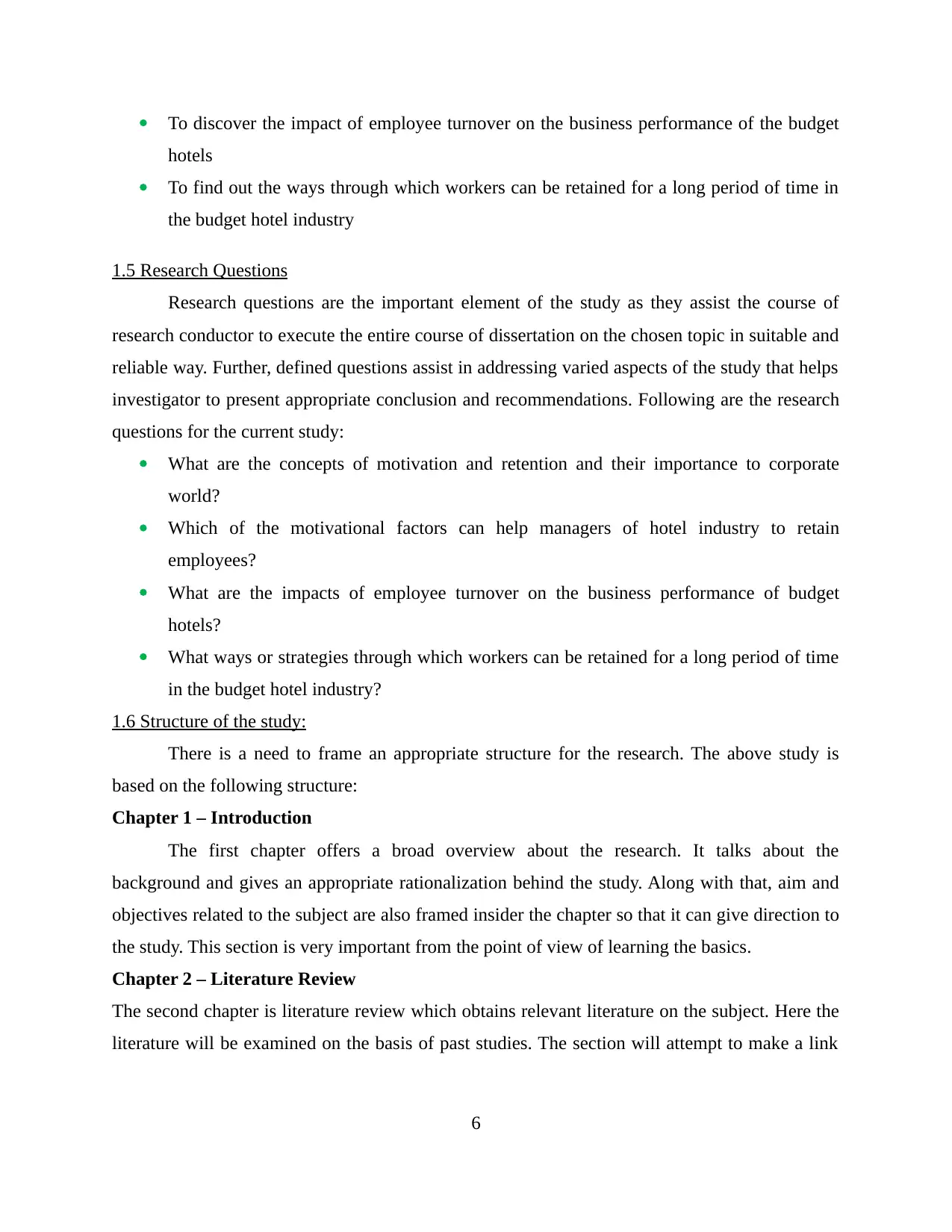
To discover the impact of employee turnover on the business performance of the budget
hotels
To find out the ways through which workers can be retained for a long period of time in
the budget hotel industry
1.5 Research Questions
Research questions are the important element of the study as they assist the course of
research conductor to execute the entire course of dissertation on the chosen topic in suitable and
reliable way. Further, defined questions assist in addressing varied aspects of the study that helps
investigator to present appropriate conclusion and recommendations. Following are the research
questions for the current study:
What are the concepts of motivation and retention and their importance to corporate
world?
Which of the motivational factors can help managers of hotel industry to retain
employees?
What are the impacts of employee turnover on the business performance of budget
hotels?
What ways or strategies through which workers can be retained for a long period of time
in the budget hotel industry?
1.6 Structure of the study:
There is a need to frame an appropriate structure for the research. The above study is
based on the following structure:
Chapter 1 – Introduction
The first chapter offers a broad overview about the research. It talks about the
background and gives an appropriate rationalization behind the study. Along with that, aim and
objectives related to the subject are also framed insider the chapter so that it can give direction to
the study. This section is very important from the point of view of learning the basics.
Chapter 2 – Literature Review
The second chapter is literature review which obtains relevant literature on the subject. Here the
literature will be examined on the basis of past studies. The section will attempt to make a link
6
hotels
To find out the ways through which workers can be retained for a long period of time in
the budget hotel industry
1.5 Research Questions
Research questions are the important element of the study as they assist the course of
research conductor to execute the entire course of dissertation on the chosen topic in suitable and
reliable way. Further, defined questions assist in addressing varied aspects of the study that helps
investigator to present appropriate conclusion and recommendations. Following are the research
questions for the current study:
What are the concepts of motivation and retention and their importance to corporate
world?
Which of the motivational factors can help managers of hotel industry to retain
employees?
What are the impacts of employee turnover on the business performance of budget
hotels?
What ways or strategies through which workers can be retained for a long period of time
in the budget hotel industry?
1.6 Structure of the study:
There is a need to frame an appropriate structure for the research. The above study is
based on the following structure:
Chapter 1 – Introduction
The first chapter offers a broad overview about the research. It talks about the
background and gives an appropriate rationalization behind the study. Along with that, aim and
objectives related to the subject are also framed insider the chapter so that it can give direction to
the study. This section is very important from the point of view of learning the basics.
Chapter 2 – Literature Review
The second chapter is literature review which obtains relevant literature on the subject. Here the
literature will be examined on the basis of past studies. The section will attempt to make a link
6
⊘ This is a preview!⊘
Do you want full access?
Subscribe today to unlock all pages.

Trusted by 1+ million students worldwide
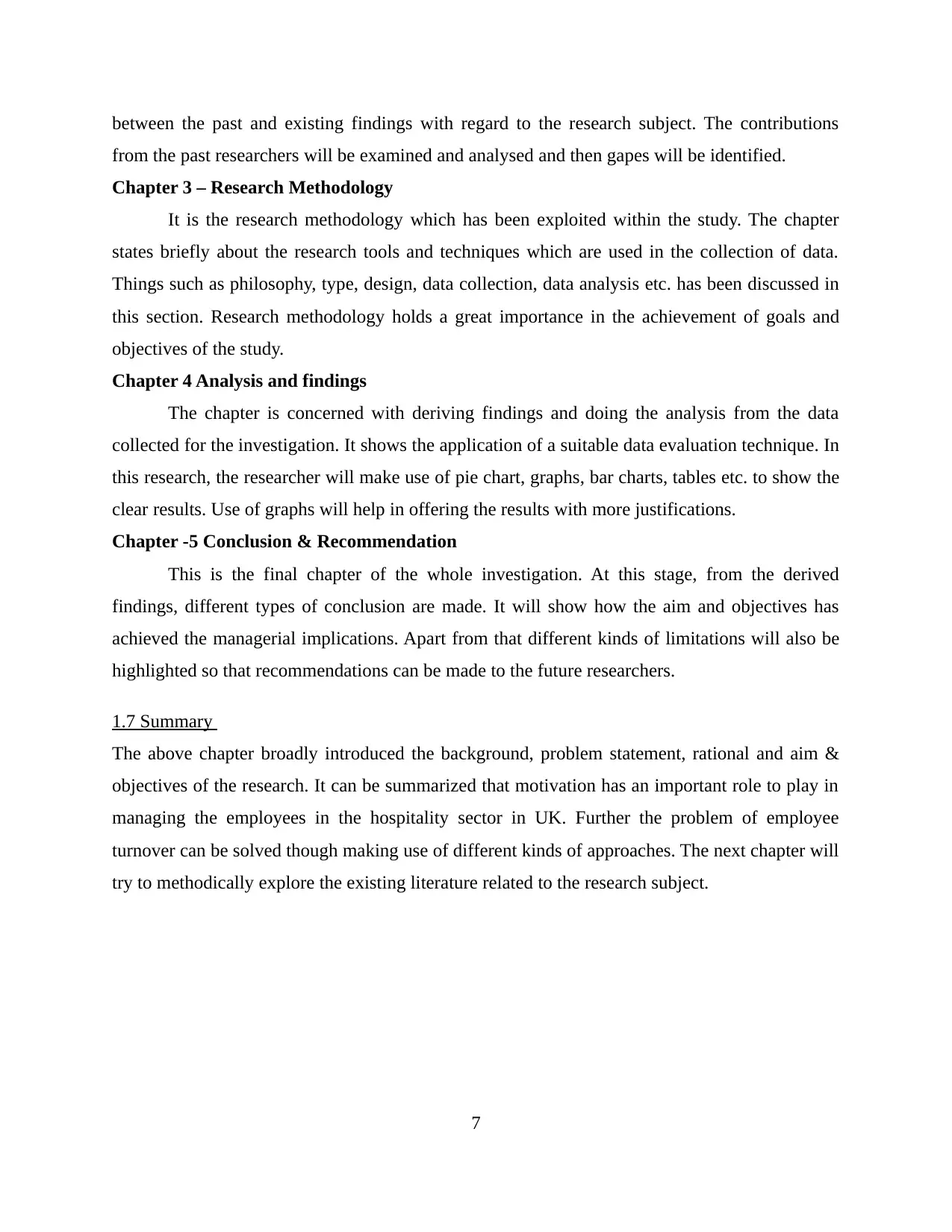
between the past and existing findings with regard to the research subject. The contributions
from the past researchers will be examined and analysed and then gapes will be identified.
Chapter 3 – Research Methodology
It is the research methodology which has been exploited within the study. The chapter
states briefly about the research tools and techniques which are used in the collection of data.
Things such as philosophy, type, design, data collection, data analysis etc. has been discussed in
this section. Research methodology holds a great importance in the achievement of goals and
objectives of the study.
Chapter 4 Analysis and findings
The chapter is concerned with deriving findings and doing the analysis from the data
collected for the investigation. It shows the application of a suitable data evaluation technique. In
this research, the researcher will make use of pie chart, graphs, bar charts, tables etc. to show the
clear results. Use of graphs will help in offering the results with more justifications.
Chapter -5 Conclusion & Recommendation
This is the final chapter of the whole investigation. At this stage, from the derived
findings, different types of conclusion are made. It will show how the aim and objectives has
achieved the managerial implications. Apart from that different kinds of limitations will also be
highlighted so that recommendations can be made to the future researchers.
1.7 Summary
The above chapter broadly introduced the background, problem statement, rational and aim &
objectives of the research. It can be summarized that motivation has an important role to play in
managing the employees in the hospitality sector in UK. Further the problem of employee
turnover can be solved though making use of different kinds of approaches. The next chapter will
try to methodically explore the existing literature related to the research subject.
7
from the past researchers will be examined and analysed and then gapes will be identified.
Chapter 3 – Research Methodology
It is the research methodology which has been exploited within the study. The chapter
states briefly about the research tools and techniques which are used in the collection of data.
Things such as philosophy, type, design, data collection, data analysis etc. has been discussed in
this section. Research methodology holds a great importance in the achievement of goals and
objectives of the study.
Chapter 4 Analysis and findings
The chapter is concerned with deriving findings and doing the analysis from the data
collected for the investigation. It shows the application of a suitable data evaluation technique. In
this research, the researcher will make use of pie chart, graphs, bar charts, tables etc. to show the
clear results. Use of graphs will help in offering the results with more justifications.
Chapter -5 Conclusion & Recommendation
This is the final chapter of the whole investigation. At this stage, from the derived
findings, different types of conclusion are made. It will show how the aim and objectives has
achieved the managerial implications. Apart from that different kinds of limitations will also be
highlighted so that recommendations can be made to the future researchers.
1.7 Summary
The above chapter broadly introduced the background, problem statement, rational and aim &
objectives of the research. It can be summarized that motivation has an important role to play in
managing the employees in the hospitality sector in UK. Further the problem of employee
turnover can be solved though making use of different kinds of approaches. The next chapter will
try to methodically explore the existing literature related to the research subject.
7
Paraphrase This Document
Need a fresh take? Get an instant paraphrase of this document with our AI Paraphraser
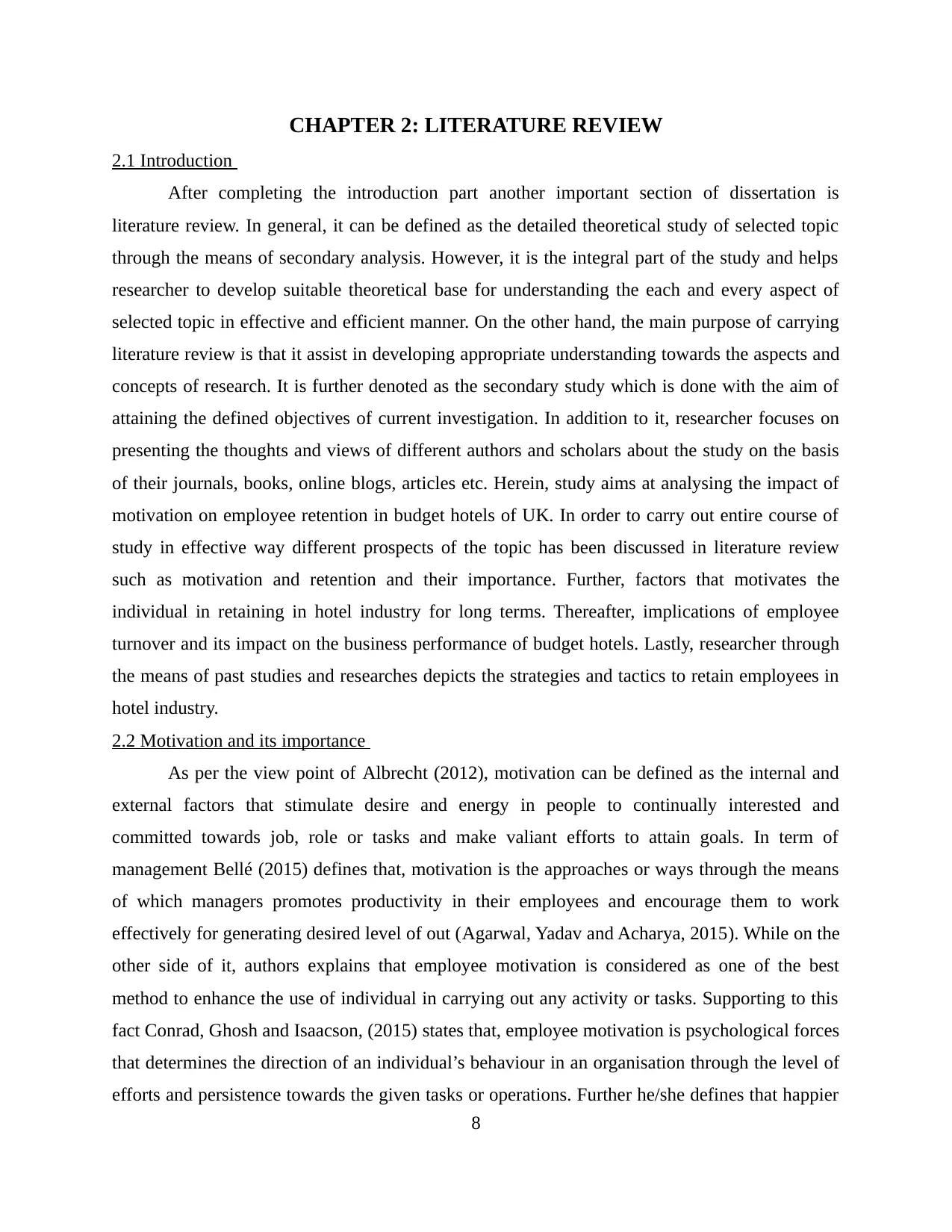
CHAPTER 2: LITERATURE REVIEW
2.1 Introduction
After completing the introduction part another important section of dissertation is
literature review. In general, it can be defined as the detailed theoretical study of selected topic
through the means of secondary analysis. However, it is the integral part of the study and helps
researcher to develop suitable theoretical base for understanding the each and every aspect of
selected topic in effective and efficient manner. On the other hand, the main purpose of carrying
literature review is that it assist in developing appropriate understanding towards the aspects and
concepts of research. It is further denoted as the secondary study which is done with the aim of
attaining the defined objectives of current investigation. In addition to it, researcher focuses on
presenting the thoughts and views of different authors and scholars about the study on the basis
of their journals, books, online blogs, articles etc. Herein, study aims at analysing the impact of
motivation on employee retention in budget hotels of UK. In order to carry out entire course of
study in effective way different prospects of the topic has been discussed in literature review
such as motivation and retention and their importance. Further, factors that motivates the
individual in retaining in hotel industry for long terms. Thereafter, implications of employee
turnover and its impact on the business performance of budget hotels. Lastly, researcher through
the means of past studies and researches depicts the strategies and tactics to retain employees in
hotel industry.
2.2 Motivation and its importance
As per the view point of Albrecht (2012), motivation can be defined as the internal and
external factors that stimulate desire and energy in people to continually interested and
committed towards job, role or tasks and make valiant efforts to attain goals. In term of
management Bellé (2015) defines that, motivation is the approaches or ways through the means
of which managers promotes productivity in their employees and encourage them to work
effectively for generating desired level of out (Agarwal, Yadav and Acharya, 2015). While on the
other side of it, authors explains that employee motivation is considered as one of the best
method to enhance the use of individual in carrying out any activity or tasks. Supporting to this
fact Conrad, Ghosh and Isaacson, (2015) states that, employee motivation is psychological forces
that determines the direction of an individual’s behaviour in an organisation through the level of
efforts and persistence towards the given tasks or operations. Further he/she defines that happier
8
2.1 Introduction
After completing the introduction part another important section of dissertation is
literature review. In general, it can be defined as the detailed theoretical study of selected topic
through the means of secondary analysis. However, it is the integral part of the study and helps
researcher to develop suitable theoretical base for understanding the each and every aspect of
selected topic in effective and efficient manner. On the other hand, the main purpose of carrying
literature review is that it assist in developing appropriate understanding towards the aspects and
concepts of research. It is further denoted as the secondary study which is done with the aim of
attaining the defined objectives of current investigation. In addition to it, researcher focuses on
presenting the thoughts and views of different authors and scholars about the study on the basis
of their journals, books, online blogs, articles etc. Herein, study aims at analysing the impact of
motivation on employee retention in budget hotels of UK. In order to carry out entire course of
study in effective way different prospects of the topic has been discussed in literature review
such as motivation and retention and their importance. Further, factors that motivates the
individual in retaining in hotel industry for long terms. Thereafter, implications of employee
turnover and its impact on the business performance of budget hotels. Lastly, researcher through
the means of past studies and researches depicts the strategies and tactics to retain employees in
hotel industry.
2.2 Motivation and its importance
As per the view point of Albrecht (2012), motivation can be defined as the internal and
external factors that stimulate desire and energy in people to continually interested and
committed towards job, role or tasks and make valiant efforts to attain goals. In term of
management Bellé (2015) defines that, motivation is the approaches or ways through the means
of which managers promotes productivity in their employees and encourage them to work
effectively for generating desired level of out (Agarwal, Yadav and Acharya, 2015). While on the
other side of it, authors explains that employee motivation is considered as one of the best
method to enhance the use of individual in carrying out any activity or tasks. Supporting to this
fact Conrad, Ghosh and Isaacson, (2015) states that, employee motivation is psychological forces
that determines the direction of an individual’s behaviour in an organisation through the level of
efforts and persistence towards the given tasks or operations. Further he/she defines that happier
8
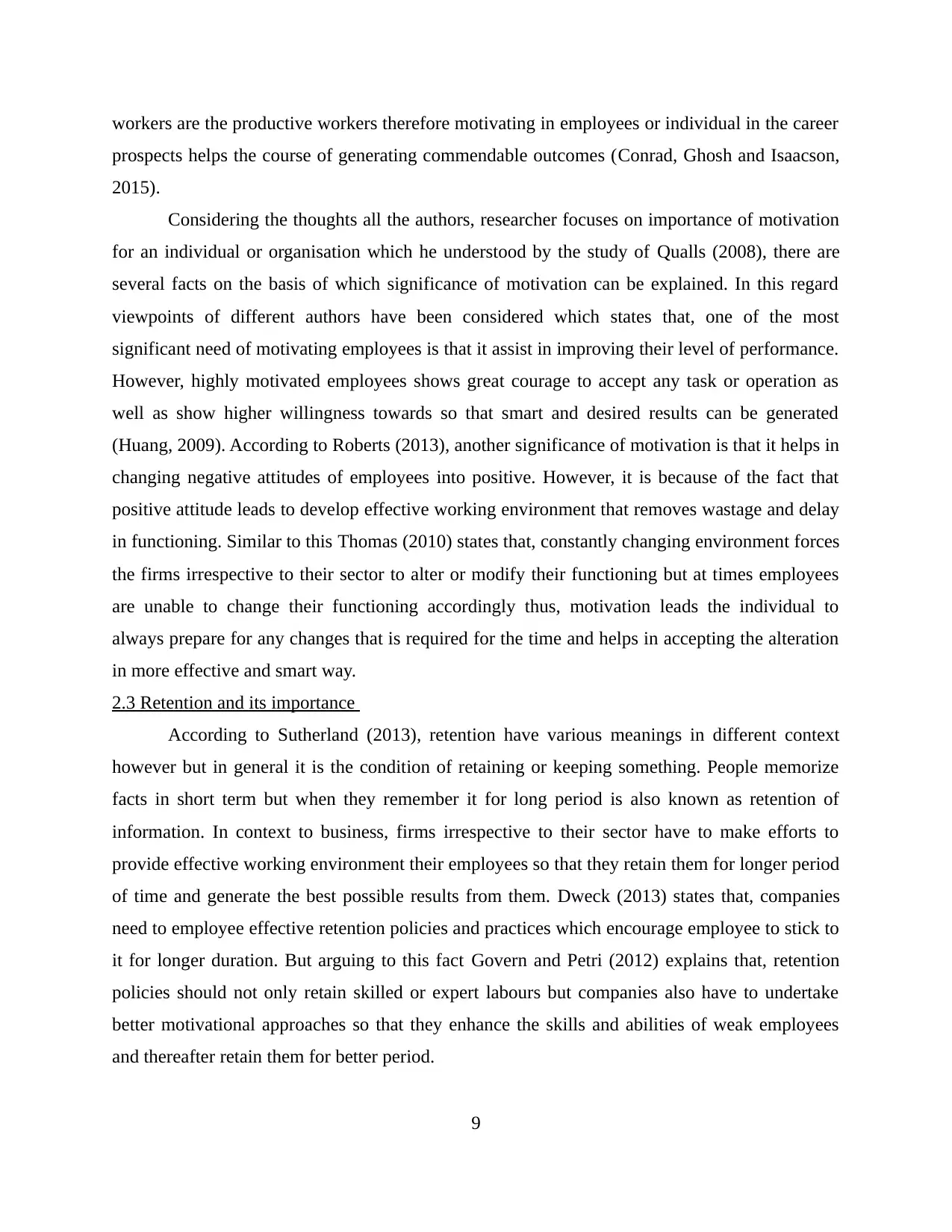
workers are the productive workers therefore motivating in employees or individual in the career
prospects helps the course of generating commendable outcomes (Conrad, Ghosh and Isaacson,
2015).
Considering the thoughts all the authors, researcher focuses on importance of motivation
for an individual or organisation which he understood by the study of Qualls (2008), there are
several facts on the basis of which significance of motivation can be explained. In this regard
viewpoints of different authors have been considered which states that, one of the most
significant need of motivating employees is that it assist in improving their level of performance.
However, highly motivated employees shows great courage to accept any task or operation as
well as show higher willingness towards so that smart and desired results can be generated
(Huang, 2009). According to Roberts (2013), another significance of motivation is that it helps in
changing negative attitudes of employees into positive. However, it is because of the fact that
positive attitude leads to develop effective working environment that removes wastage and delay
in functioning. Similar to this Thomas (2010) states that, constantly changing environment forces
the firms irrespective to their sector to alter or modify their functioning but at times employees
are unable to change their functioning accordingly thus, motivation leads the individual to
always prepare for any changes that is required for the time and helps in accepting the alteration
in more effective and smart way.
2.3 Retention and its importance
According to Sutherland (2013), retention have various meanings in different context
however but in general it is the condition of retaining or keeping something. People memorize
facts in short term but when they remember it for long period is also known as retention of
information. In context to business, firms irrespective to their sector have to make efforts to
provide effective working environment their employees so that they retain them for longer period
of time and generate the best possible results from them. Dweck (2013) states that, companies
need to employee effective retention policies and practices which encourage employee to stick to
it for longer duration. But arguing to this fact Govern and Petri (2012) explains that, retention
policies should not only retain skilled or expert labours but companies also have to undertake
better motivational approaches so that they enhance the skills and abilities of weak employees
and thereafter retain them for better period.
9
prospects helps the course of generating commendable outcomes (Conrad, Ghosh and Isaacson,
2015).
Considering the thoughts all the authors, researcher focuses on importance of motivation
for an individual or organisation which he understood by the study of Qualls (2008), there are
several facts on the basis of which significance of motivation can be explained. In this regard
viewpoints of different authors have been considered which states that, one of the most
significant need of motivating employees is that it assist in improving their level of performance.
However, highly motivated employees shows great courage to accept any task or operation as
well as show higher willingness towards so that smart and desired results can be generated
(Huang, 2009). According to Roberts (2013), another significance of motivation is that it helps in
changing negative attitudes of employees into positive. However, it is because of the fact that
positive attitude leads to develop effective working environment that removes wastage and delay
in functioning. Similar to this Thomas (2010) states that, constantly changing environment forces
the firms irrespective to their sector to alter or modify their functioning but at times employees
are unable to change their functioning accordingly thus, motivation leads the individual to
always prepare for any changes that is required for the time and helps in accepting the alteration
in more effective and smart way.
2.3 Retention and its importance
According to Sutherland (2013), retention have various meanings in different context
however but in general it is the condition of retaining or keeping something. People memorize
facts in short term but when they remember it for long period is also known as retention of
information. In context to business, firms irrespective to their sector have to make efforts to
provide effective working environment their employees so that they retain them for longer period
of time and generate the best possible results from them. Dweck (2013) states that, companies
need to employee effective retention policies and practices which encourage employee to stick to
it for longer duration. But arguing to this fact Govern and Petri (2012) explains that, retention
policies should not only retain skilled or expert labours but companies also have to undertake
better motivational approaches so that they enhance the skills and abilities of weak employees
and thereafter retain them for better period.
9
⊘ This is a preview!⊘
Do you want full access?
Subscribe today to unlock all pages.

Trusted by 1+ million students worldwide
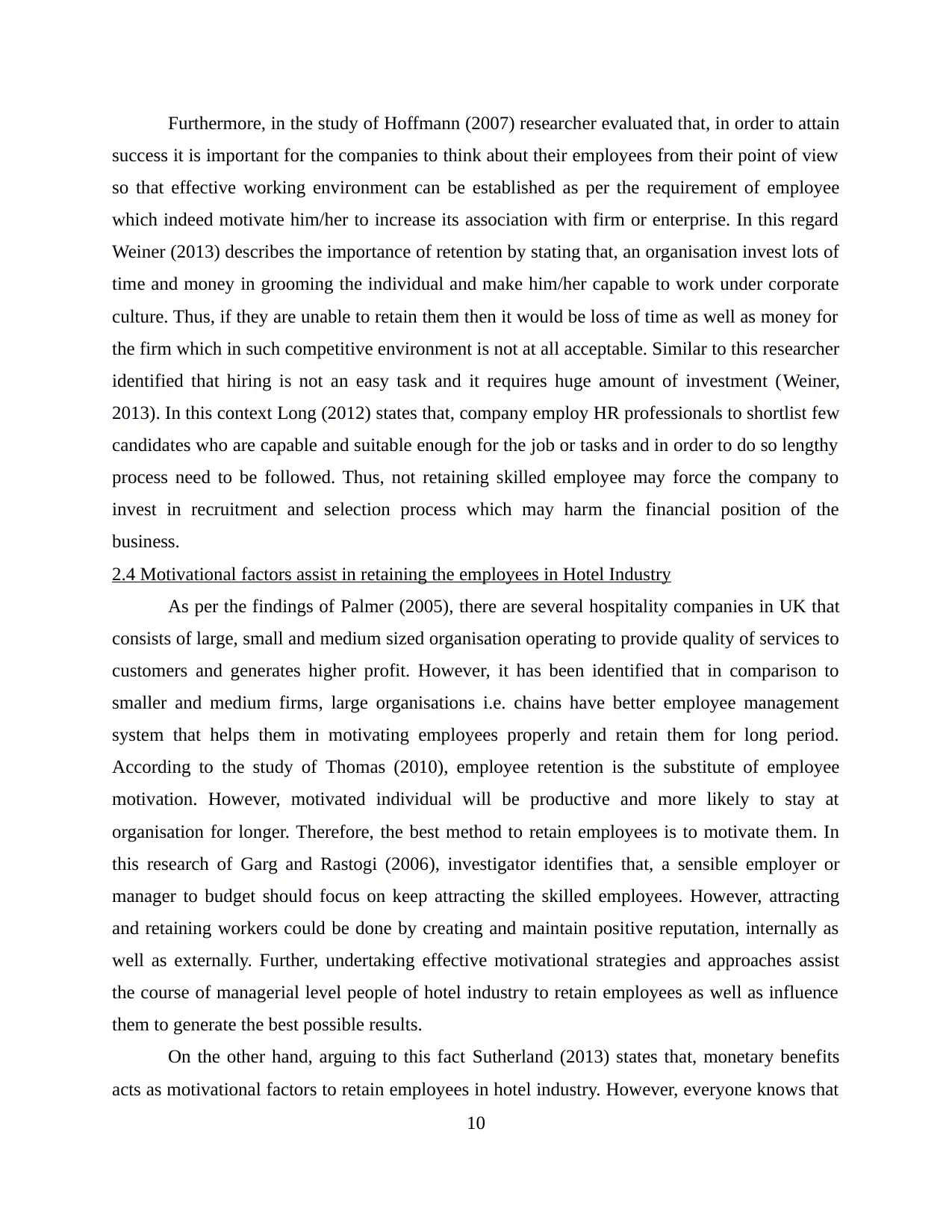
Furthermore, in the study of Hoffmann (2007) researcher evaluated that, in order to attain
success it is important for the companies to think about their employees from their point of view
so that effective working environment can be established as per the requirement of employee
which indeed motivate him/her to increase its association with firm or enterprise. In this regard
Weiner (2013) describes the importance of retention by stating that, an organisation invest lots of
time and money in grooming the individual and make him/her capable to work under corporate
culture. Thus, if they are unable to retain them then it would be loss of time as well as money for
the firm which in such competitive environment is not at all acceptable. Similar to this researcher
identified that hiring is not an easy task and it requires huge amount of investment (Weiner,
2013). In this context Long (2012) states that, company employ HR professionals to shortlist few
candidates who are capable and suitable enough for the job or tasks and in order to do so lengthy
process need to be followed. Thus, not retaining skilled employee may force the company to
invest in recruitment and selection process which may harm the financial position of the
business.
2.4 Motivational factors assist in retaining the employees in Hotel Industry
As per the findings of Palmer (2005), there are several hospitality companies in UK that
consists of large, small and medium sized organisation operating to provide quality of services to
customers and generates higher profit. However, it has been identified that in comparison to
smaller and medium firms, large organisations i.e. chains have better employee management
system that helps them in motivating employees properly and retain them for long period.
According to the study of Thomas (2010), employee retention is the substitute of employee
motivation. However, motivated individual will be productive and more likely to stay at
organisation for longer. Therefore, the best method to retain employees is to motivate them. In
this research of Garg and Rastogi (2006), investigator identifies that, a sensible employer or
manager to budget should focus on keep attracting the skilled employees. However, attracting
and retaining workers could be done by creating and maintain positive reputation, internally as
well as externally. Further, undertaking effective motivational strategies and approaches assist
the course of managerial level people of hotel industry to retain employees as well as influence
them to generate the best possible results.
On the other hand, arguing to this fact Sutherland (2013) states that, monetary benefits
acts as motivational factors to retain employees in hotel industry. However, everyone knows that
10
success it is important for the companies to think about their employees from their point of view
so that effective working environment can be established as per the requirement of employee
which indeed motivate him/her to increase its association with firm or enterprise. In this regard
Weiner (2013) describes the importance of retention by stating that, an organisation invest lots of
time and money in grooming the individual and make him/her capable to work under corporate
culture. Thus, if they are unable to retain them then it would be loss of time as well as money for
the firm which in such competitive environment is not at all acceptable. Similar to this researcher
identified that hiring is not an easy task and it requires huge amount of investment (Weiner,
2013). In this context Long (2012) states that, company employ HR professionals to shortlist few
candidates who are capable and suitable enough for the job or tasks and in order to do so lengthy
process need to be followed. Thus, not retaining skilled employee may force the company to
invest in recruitment and selection process which may harm the financial position of the
business.
2.4 Motivational factors assist in retaining the employees in Hotel Industry
As per the findings of Palmer (2005), there are several hospitality companies in UK that
consists of large, small and medium sized organisation operating to provide quality of services to
customers and generates higher profit. However, it has been identified that in comparison to
smaller and medium firms, large organisations i.e. chains have better employee management
system that helps them in motivating employees properly and retain them for long period.
According to the study of Thomas (2010), employee retention is the substitute of employee
motivation. However, motivated individual will be productive and more likely to stay at
organisation for longer. Therefore, the best method to retain employees is to motivate them. In
this research of Garg and Rastogi (2006), investigator identifies that, a sensible employer or
manager to budget should focus on keep attracting the skilled employees. However, attracting
and retaining workers could be done by creating and maintain positive reputation, internally as
well as externally. Further, undertaking effective motivational strategies and approaches assist
the course of managerial level people of hotel industry to retain employees as well as influence
them to generate the best possible results.
On the other hand, arguing to this fact Sutherland (2013) states that, monetary benefits
acts as motivational factors to retain employees in hotel industry. However, everyone knows that
10
Paraphrase This Document
Need a fresh take? Get an instant paraphrase of this document with our AI Paraphraser
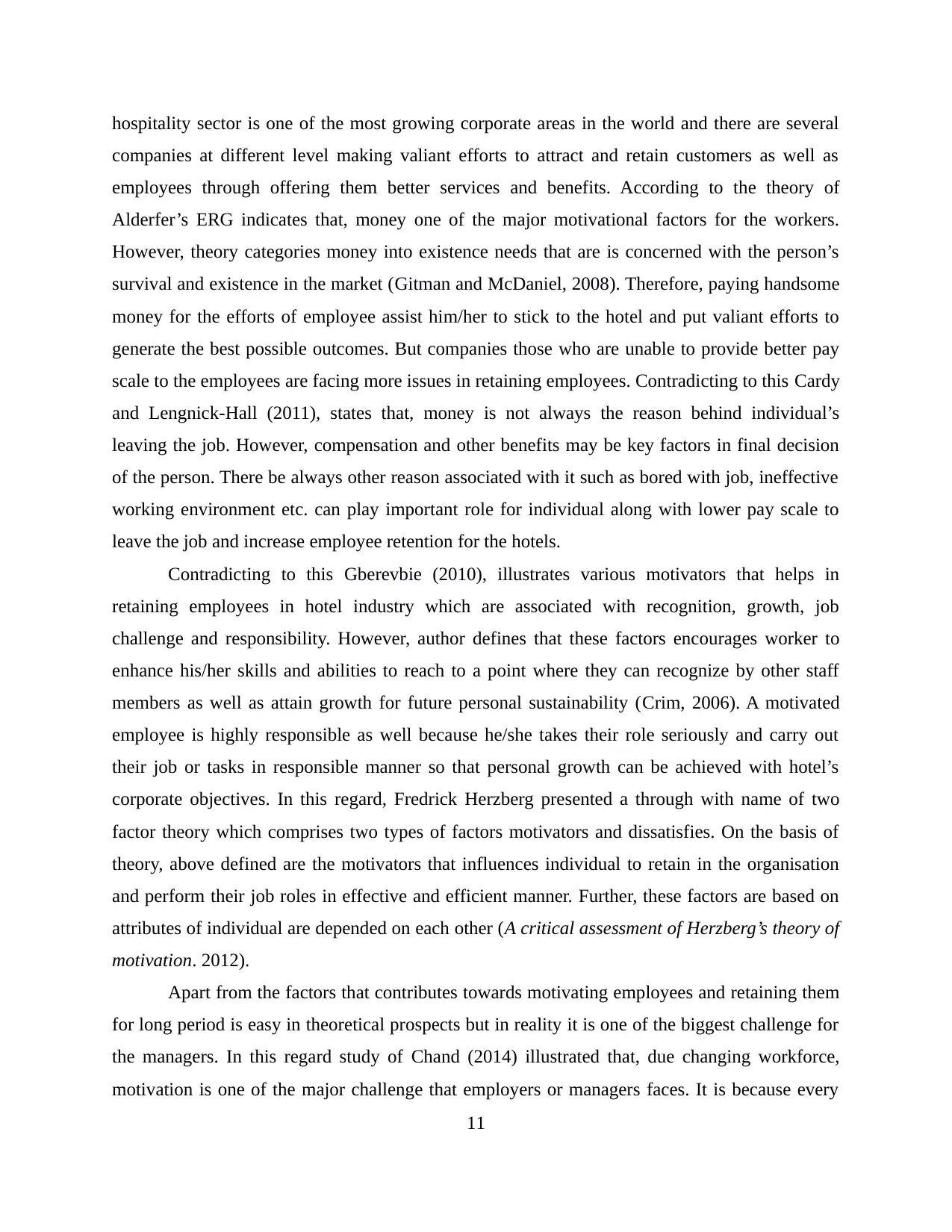
hospitality sector is one of the most growing corporate areas in the world and there are several
companies at different level making valiant efforts to attract and retain customers as well as
employees through offering them better services and benefits. According to the theory of
Alderfer’s ERG indicates that, money one of the major motivational factors for the workers.
However, theory categories money into existence needs that are is concerned with the person’s
survival and existence in the market (Gitman and McDaniel, 2008). Therefore, paying handsome
money for the efforts of employee assist him/her to stick to the hotel and put valiant efforts to
generate the best possible outcomes. But companies those who are unable to provide better pay
scale to the employees are facing more issues in retaining employees. Contradicting to this Cardy
and Lengnick-Hall (2011), states that, money is not always the reason behind individual’s
leaving the job. However, compensation and other benefits may be key factors in final decision
of the person. There be always other reason associated with it such as bored with job, ineffective
working environment etc. can play important role for individual along with lower pay scale to
leave the job and increase employee retention for the hotels.
Contradicting to this Gberevbie (2010), illustrates various motivators that helps in
retaining employees in hotel industry which are associated with recognition, growth, job
challenge and responsibility. However, author defines that these factors encourages worker to
enhance his/her skills and abilities to reach to a point where they can recognize by other staff
members as well as attain growth for future personal sustainability (Crim, 2006). A motivated
employee is highly responsible as well because he/she takes their role seriously and carry out
their job or tasks in responsible manner so that personal growth can be achieved with hotel’s
corporate objectives. In this regard, Fredrick Herzberg presented a through with name of two
factor theory which comprises two types of factors motivators and dissatisfies. On the basis of
theory, above defined are the motivators that influences individual to retain in the organisation
and perform their job roles in effective and efficient manner. Further, these factors are based on
attributes of individual are depended on each other (A critical assessment of Herzberg’s theory of
motivation. 2012).
Apart from the factors that contributes towards motivating employees and retaining them
for long period is easy in theoretical prospects but in reality it is one of the biggest challenge for
the managers. In this regard study of Chand (2014) illustrated that, due changing workforce,
motivation is one of the major challenge that employers or managers faces. It is because every
11
companies at different level making valiant efforts to attract and retain customers as well as
employees through offering them better services and benefits. According to the theory of
Alderfer’s ERG indicates that, money one of the major motivational factors for the workers.
However, theory categories money into existence needs that are is concerned with the person’s
survival and existence in the market (Gitman and McDaniel, 2008). Therefore, paying handsome
money for the efforts of employee assist him/her to stick to the hotel and put valiant efforts to
generate the best possible outcomes. But companies those who are unable to provide better pay
scale to the employees are facing more issues in retaining employees. Contradicting to this Cardy
and Lengnick-Hall (2011), states that, money is not always the reason behind individual’s
leaving the job. However, compensation and other benefits may be key factors in final decision
of the person. There be always other reason associated with it such as bored with job, ineffective
working environment etc. can play important role for individual along with lower pay scale to
leave the job and increase employee retention for the hotels.
Contradicting to this Gberevbie (2010), illustrates various motivators that helps in
retaining employees in hotel industry which are associated with recognition, growth, job
challenge and responsibility. However, author defines that these factors encourages worker to
enhance his/her skills and abilities to reach to a point where they can recognize by other staff
members as well as attain growth for future personal sustainability (Crim, 2006). A motivated
employee is highly responsible as well because he/she takes their role seriously and carry out
their job or tasks in responsible manner so that personal growth can be achieved with hotel’s
corporate objectives. In this regard, Fredrick Herzberg presented a through with name of two
factor theory which comprises two types of factors motivators and dissatisfies. On the basis of
theory, above defined are the motivators that influences individual to retain in the organisation
and perform their job roles in effective and efficient manner. Further, these factors are based on
attributes of individual are depended on each other (A critical assessment of Herzberg’s theory of
motivation. 2012).
Apart from the factors that contributes towards motivating employees and retaining them
for long period is easy in theoretical prospects but in reality it is one of the biggest challenge for
the managers. In this regard study of Chand (2014) illustrated that, due changing workforce,
motivation is one of the major challenge that employers or managers faces. It is because every
11
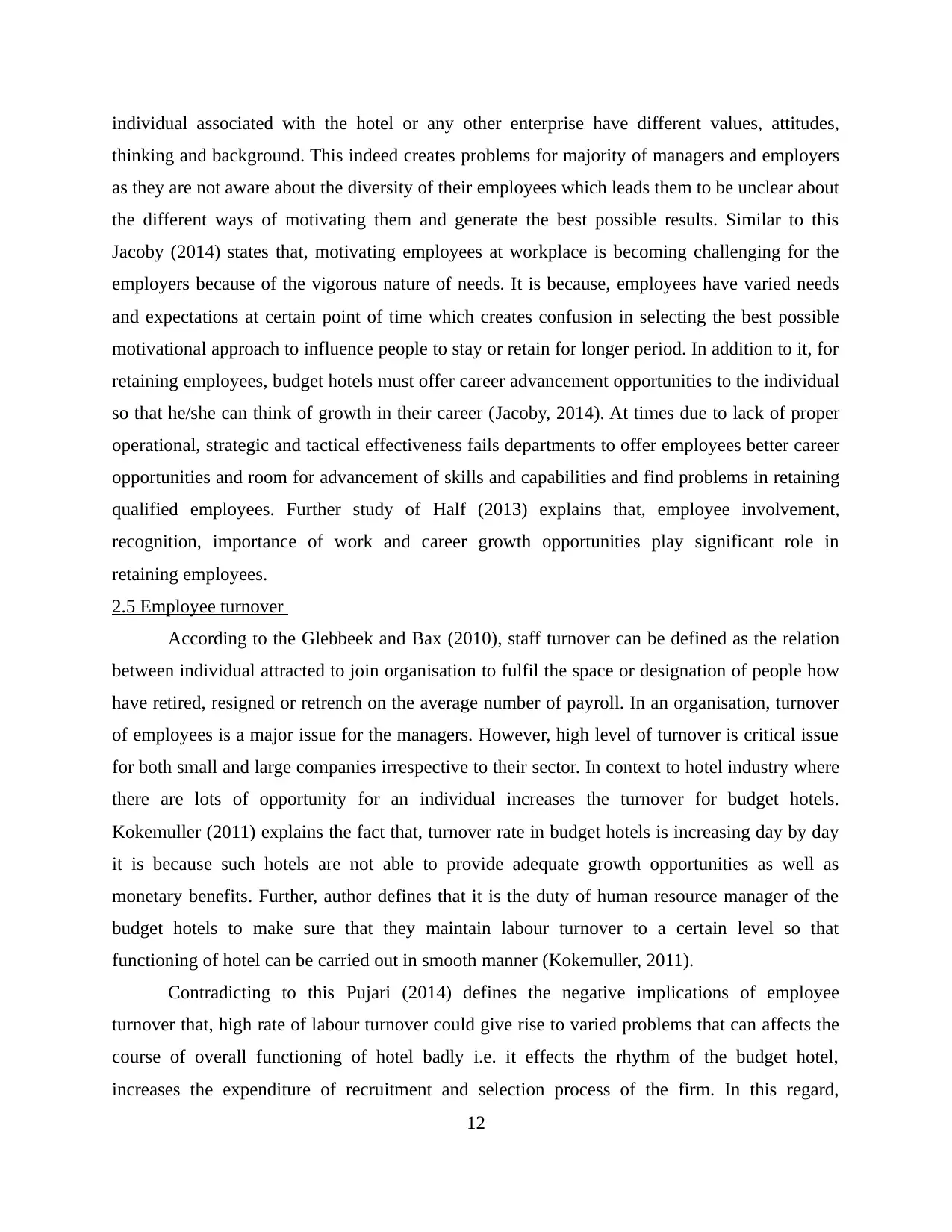
individual associated with the hotel or any other enterprise have different values, attitudes,
thinking and background. This indeed creates problems for majority of managers and employers
as they are not aware about the diversity of their employees which leads them to be unclear about
the different ways of motivating them and generate the best possible results. Similar to this
Jacoby (2014) states that, motivating employees at workplace is becoming challenging for the
employers because of the vigorous nature of needs. It is because, employees have varied needs
and expectations at certain point of time which creates confusion in selecting the best possible
motivational approach to influence people to stay or retain for longer period. In addition to it, for
retaining employees, budget hotels must offer career advancement opportunities to the individual
so that he/she can think of growth in their career (Jacoby, 2014). At times due to lack of proper
operational, strategic and tactical effectiveness fails departments to offer employees better career
opportunities and room for advancement of skills and capabilities and find problems in retaining
qualified employees. Further study of Half (2013) explains that, employee involvement,
recognition, importance of work and career growth opportunities play significant role in
retaining employees.
2.5 Employee turnover
According to the Glebbeek and Bax (2010), staff turnover can be defined as the relation
between individual attracted to join organisation to fulfil the space or designation of people how
have retired, resigned or retrench on the average number of payroll. In an organisation, turnover
of employees is a major issue for the managers. However, high level of turnover is critical issue
for both small and large companies irrespective to their sector. In context to hotel industry where
there are lots of opportunity for an individual increases the turnover for budget hotels.
Kokemuller (2011) explains the fact that, turnover rate in budget hotels is increasing day by day
it is because such hotels are not able to provide adequate growth opportunities as well as
monetary benefits. Further, author defines that it is the duty of human resource manager of the
budget hotels to make sure that they maintain labour turnover to a certain level so that
functioning of hotel can be carried out in smooth manner (Kokemuller, 2011).
Contradicting to this Pujari (2014) defines the negative implications of employee
turnover that, high rate of labour turnover could give rise to varied problems that can affects the
course of overall functioning of hotel badly i.e. it effects the rhythm of the budget hotel,
increases the expenditure of recruitment and selection process of the firm. In this regard,
12
thinking and background. This indeed creates problems for majority of managers and employers
as they are not aware about the diversity of their employees which leads them to be unclear about
the different ways of motivating them and generate the best possible results. Similar to this
Jacoby (2014) states that, motivating employees at workplace is becoming challenging for the
employers because of the vigorous nature of needs. It is because, employees have varied needs
and expectations at certain point of time which creates confusion in selecting the best possible
motivational approach to influence people to stay or retain for longer period. In addition to it, for
retaining employees, budget hotels must offer career advancement opportunities to the individual
so that he/she can think of growth in their career (Jacoby, 2014). At times due to lack of proper
operational, strategic and tactical effectiveness fails departments to offer employees better career
opportunities and room for advancement of skills and capabilities and find problems in retaining
qualified employees. Further study of Half (2013) explains that, employee involvement,
recognition, importance of work and career growth opportunities play significant role in
retaining employees.
2.5 Employee turnover
According to the Glebbeek and Bax (2010), staff turnover can be defined as the relation
between individual attracted to join organisation to fulfil the space or designation of people how
have retired, resigned or retrench on the average number of payroll. In an organisation, turnover
of employees is a major issue for the managers. However, high level of turnover is critical issue
for both small and large companies irrespective to their sector. In context to hotel industry where
there are lots of opportunity for an individual increases the turnover for budget hotels.
Kokemuller (2011) explains the fact that, turnover rate in budget hotels is increasing day by day
it is because such hotels are not able to provide adequate growth opportunities as well as
monetary benefits. Further, author defines that it is the duty of human resource manager of the
budget hotels to make sure that they maintain labour turnover to a certain level so that
functioning of hotel can be carried out in smooth manner (Kokemuller, 2011).
Contradicting to this Pujari (2014) defines the negative implications of employee
turnover that, high rate of labour turnover could give rise to varied problems that can affects the
course of overall functioning of hotel badly i.e. it effects the rhythm of the budget hotel,
increases the expenditure of recruitment and selection process of the firm. In this regard,
12
⊘ This is a preview!⊘
Do you want full access?
Subscribe today to unlock all pages.

Trusted by 1+ million students worldwide
1 out of 39
Related Documents
Your All-in-One AI-Powered Toolkit for Academic Success.
+13062052269
info@desklib.com
Available 24*7 on WhatsApp / Email
![[object Object]](/_next/static/media/star-bottom.7253800d.svg)
Unlock your academic potential
Copyright © 2020–2026 A2Z Services. All Rights Reserved. Developed and managed by ZUCOL.





